Last Updated: 28/05/2025
Corgi Breed Guide | Diet Health & Personality
Want to know if a Corgi is right for you? Take a look at our Vet-written guide for all the facts health and care tips.
Author: Dr Maree Monaghan BVSc (Hons)
Reading Time: 8 minutes - short read
You can't think of Corgis without thinking of Queen Elizabeth II who was always surrounded by these engaging little dogs. Their cute pointy ears, short legs and fluffy coats don't give many clues to the Corgi's heritage as a cattle herding dog. There are actually two breeds of Corgi - the Pembroke Welsh Corgi which usually has a bobtail and the larger Cardigan Welsh Corgi which has a plumed tail.
Facts about the Corgi
| Breed size: | Place of origin: | Intelligence: |
| Medium | Wales | High |
| Breed group: | Energy level: | Weight range: |
| Working dogs | High |
Cardigan: 14 - 17kg Pembroke: males up to 14kg, females up to 11kg |
| Life expectancy: | Tendency to bark: | Height range: |
| 12 to 15 years | High |
Cardigan: 27 - 32cm Pembroke: 25 - 30cm |
| Drool factor: | Ease of training: | Coat type: |
| Low | Moderate | Weatherproof double coat with a soft light undercoat and a coarse topcoat. |
| Shedding factor: | Overall grooming needs: | Colours: |
| Very high | High |
Cardigan: Blue merle, brindle, red, sable, tri colour with brindle points and tri colour with red points Pembroke: Red, Sable, Fawn, Black and Tan, with or without white markings on legs, brisket and neck |
How big do Corgis get?
The Cardigan Corgi is the larger of the two breeds and averages 14 to 17 kg and 27 to 32 cm height at the shoulder for both males and females. The male Pembroke Corgi is heavier than the female, and weighs up to 14 kg, whereas the females weigh up to 11 kg. They both stand 25 to 30 cm at the shoulder.
Do Corgis shed?
Corgis shed all year round particularly in Summer and Winter due to their double coat They need to be brushed at least three times a week if not daily. A double sided pin and bristle brush and a deshedding brush are essential tools if you own a Corgi.
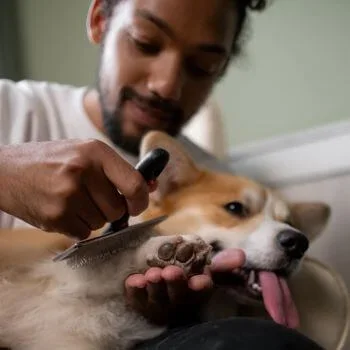
How much does a Corgi cost?
Corgi pups in Australia may cost anywhere from $2000-$4000. The pandemic significantly increased demand for Corgi puppies and the price of a purebred pup can occasionally even exceed this. Of course, as with any breed, it is cheaper to adopt an adult dog from a rescue.
How long do Corgis live?
Corgis generally live for 12-15 years. As with any breed, they will live much longer if you take good care of them. Never let your Corgi become overweight as this will lead to multiple health problems and shorten their lifespan.
Are Corgis good pets?
Like most working dog breeds, Corgis are intelligent, loyal dogs who are eager to please. If they receive the appropriate training from an early age, Corgis are excellent family pets that are good with children and other pets. They are protective of their family and make good watchdogs.
Do Corgis bark much?
Barking is a trait that was actively developed in Corgis to help them move cattle from behind when they were used as herding dogs. They were also encouraged to bark as a part of their role as watchdogs on farms to keep stray animals away. Corgis can be trained not to bark incessantly with proper training and exercise. To manage your Corgi's propensity to bark, it is vital to train them with positive reinforcement from a young age.
How do I know which Corgi breeder to choose?
When looking for a Corgi, your options are to: a) adopt from a rescue (this is our top recommendation!) b) buy from an or online marketplace or pet store (NOT recommended!), or c) Research a reputable breeder. Never purchase a puppy without inspecting the breeder's premises and asking the 10 Breeder Checklist Questions first. Good breeders socialise their animals, house them humanely, allow you to inspect their premises, and select for healthy traits and good temperaments. Read our Guide to Finding a Good Breeder for more tips.
How much exercise do Corgis need?
The Corgi is a busy dog that thrives on having a job to do. One hour of physical and mental stimulation per day like a long walk or a game will keep them happy and make them less likely to develop undesirable behaviours.
Corgi History
Corgis are one of the oldest British dog breeds and are known to have been herding cattle in Wales for thousands of years.The origins of the name Corgi are unclear - some people say that it comes from the word "kergie" which is ancient Celtic for dog. Others say it is a combination of the Welsh words "cor" (dwarf) and "ci" (dog) or it is derived from the Welsh word "curgi" which means to watch over.
Cardigan Welsh Corgis are named after Cardingshire and Pembroke Welsh Corgis after Pembrokeshire - both shires in Wales.
The Cardigan Welsh Corgi is descended from the Teckel family of dogs which were brought to Wales by Celtic immigrants from Europe around 3,000 years ago. Spitz type dogs were introduced to Wales by Flemish weavers after the Viking invasions approximately 1,000 years ago and these bred with the Cardigan Welsh Corgis in some parts of Wales to produce the Pembroke Welsh Corgi.
When farming in Wales transitioned from droving cattle to pasture to keeping sheep which were kept in fenced fields, sheep herding dogs began to take over and the Corgi was eventually replaced as a farm dog.



Corgi Personality
Corgis are lively, intelligent dogs that are very loyal and protective of their family and make excellent watchdogs. Due to their origins as herding dogs, they can be prone to "herding" and nipping, so they are not ideal for very young children. Despite its looks, the Corgi is not a cuddly couch potato and their strong will and intelligence can be challenging when trying to train them.
Best Toys for Corgis
Corgis are super smart and love a challenge so problem solving toys are ideal. Puzzle toy dog feeders and lick mats are a great way to keep your Corgi occupied and decrease their chances of becoming overweight.
Lickimat reduces calorie intake, by making small tasty treats last longer which in turn reduces the risk of over feeding.
Not only do interactive games help to prevent boredom and behavioural problems, they help to strengthen your dog's bond with you for a long and lasting friendship.
If your Corgi eats too fast, you can use the KONG Wobbler as an alternative to a dog bowl to help extend mealtime while providing exercise for them.
Your Corgi will love a fluffy squeaky version of themselves to play with.
Can't decide? Why not let us choose for you with the Curious Box? Each Curious Box contains a selection of two to three engaging toys (and treats!) Even better, the theme changes every 6 weeks, making it the perfect way to keep your dog's supply of toys and treats fresh, fun, and varied for mental stimulation!
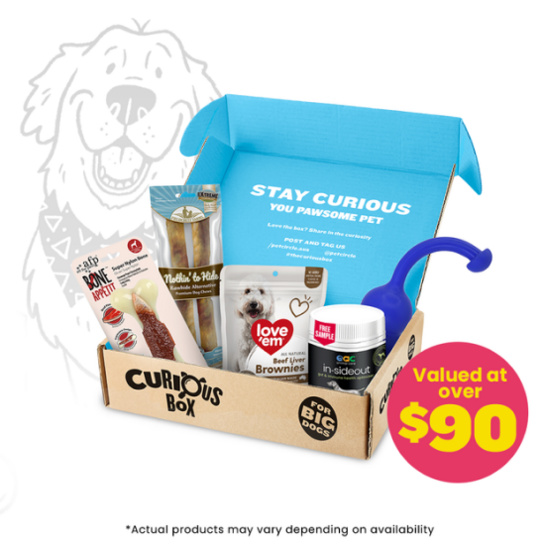
Corgi Diet and Nutrition
Corgi Puppies

Some points to note about Corgi puppy ownership include:
Food: Corgi puppies should eat a premium, medium breed formula such as Advance Medium Breed Puppy Food, Royal Canin Medium Puppy, Open Farm Puppy or Wellness CORE Grain Free Puppy until they are 12 months of age.
Behaviour: Corgi puppies have fantastic personalities but they do like to chew and destroy things, just like any puppy! Puppy proofing your house is essential. Remove any easy-to-reach toxins or electrical cords, and provide plenty of toys! For more information on puppy behaviour, take a look at our Puppy Training Guide.
Worming: Corgi puppies need to be wormed fortnightly from the age of 2-12 weeks, and then once per month after this. In Australia, Corgi puppies also require heartworm protection - you may wish to get a heartworm injection yearly at your vet, or you can simply give a monthly treatment such as Nexgard Spectra, Simparica Trio, or Credelio Plus.
For more helpful information on worming, training, socialisation, and nutrition, consult our veterinary-written Complete New Puppy Guide.
What To Feed A Corgi Puppy
Corgi puppies need to eat a premium medium puppy food that is nutritionally formulated to meet AAFCO Guidelines until they are 12 months of age. You may consider a Rotational Diet to provide exposure to different proteins and reduce the risk of food sensitivities.
Raw diets for Corgis? Raw diets are not suitable or safe for Corgi puppies due to the risk of bacterial contamination, which can lead to food poisoning and upset their sensitive tummies. Plus, an unbalanced diet can lead to nutritional deficiencies. Read more about Raw Diets: The Risks and Benefits.
When should you transition a Corgi from puppy to adult food? As a general guide, Corgis can usually be transitioned from a 'puppy' food to an 'adult' food at around 12 months of age. This does, however, vary depending on your dog's body condition score - if your pup is underweight, they may require puppy food for a little longer. Likewise, if they're starting to show a bit of 'pudge', it may be time for a lower-in-calories 'Adult' diet.
To find out whether your pup is ready to transition to an adult diet, take a look at our Body Condition Assessment Charts, or ask our Vet Squad for further advice.
Best food for Corgi Puppies
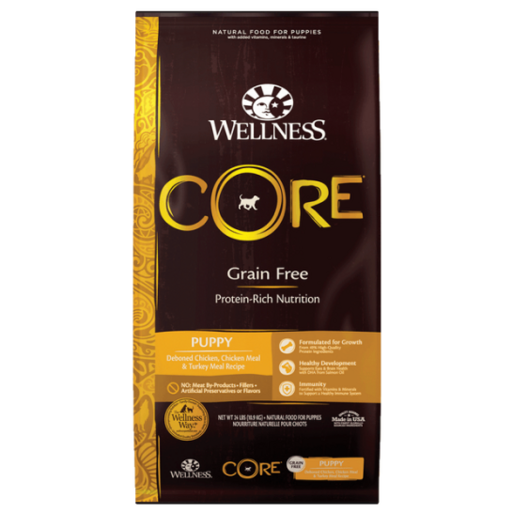
Want to know more? Check out our article: What is the best puppy food?
Best food for Adult Corgis
Corgi adults are prone to a number of health conditions including hip dysplasia and obesity and so the following diets have been recommended to help support healthy joints and maintain an ideal body condition.
Royal Canin Light Weight Care is fortified with omega 3 fatty acids from fish oil to support joint health and also helps your dog feel fuller for longer with a specific blend of soluble and insoluble fibres.
This specially formulated dry food contains omega-3 fatty acids, glucosamine and chondroitin for joint health as well as l-carnitine to maintain lean muscle mass.
This super premium, Australian made food contains fewer calories to aid weight management and is fortified with beneficial nutrients.
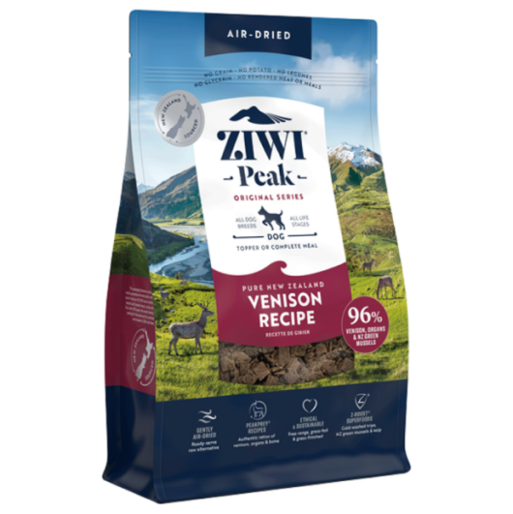
Ziwi Peak Venison Air-Dried Dog Food is a great natural choice for dogs especially those with food sensitivities. It contains Green Mussel, a natural source of glucosamine and chondroitin for joint and mobility support.
Corgi Health Problems
Despite their robust appearance, Corgis have a high probability of health problems and are one of the more expensive breeds to insure. One of the most common inherited conditions in Corgis is Hip Dysplasia and they are also prone to Intervertebral Disc Disease.
Hip Dysplasia
The term 'dysplasia' means abnormal growth, therefore 'hip dysplasia' means abnormal growth or development of the hips. What causes hip dysplasia? While the condition is primarily genetic in origin, the degree of hip dysplasia will vary between dogs due to a combination of factors such as body weight, nutrition, hormonal factors and other environmental considerations such as exercise. It's important to note that the inheritance of the gene is not simple, and breeding dogs with 'normal' hips can give rise to offspring with dysplastic hips and vice versa. Responsible breeders will ensure their breeding stock is tested prior to breeding.
Best joint supplements for Corgis
Due to their propensity to develop conditions of the joints, many Corgi owners are advised to provide joint care preventatively. Suitable joint care methods for Corgis may include joint care supplements, a joint care diet, or even simple things like ensuring your dog maintains a healthy weight.
A premium quality, vet recommended joint supplement containing green lipped mussel and epitalis to help support joint health and ease the symptoms of arthritis.
Sasha's Blend powder and chews contain green lipped mussel, abalone and marine cartilage which are rich in omega 3 fatty acids and glycosaminoglycans to support joint health.
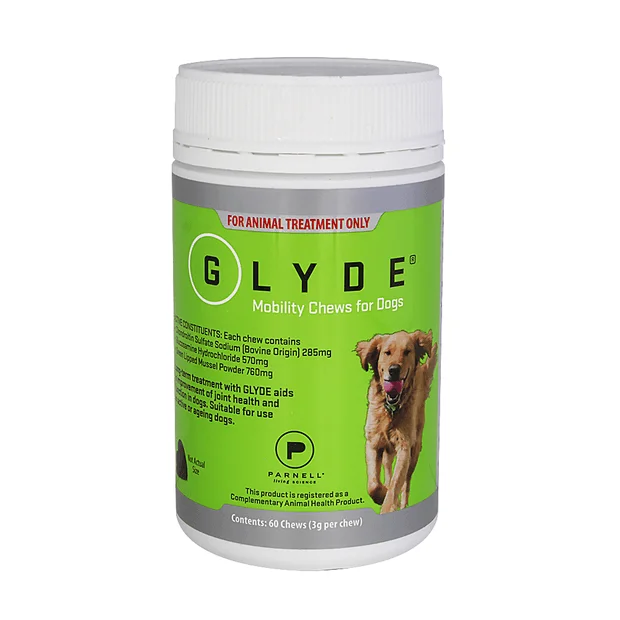
Available as powder or tasty chews, Glyde contains glucosamine, chondroitin and green lipped mussel to support joint health and mobility.
Pet Stairs are the perfect solution to prevent your Corgi putting extra strain on their joints. They reduce the jarring associated with jumping on and off furniture!
Intervertebral Disc Disease
With their short legs and long backs, it is no surprise that Corgis suffer from problems with their spines. Intervertebral Disc Disease (IVDD) occurs when the discs that sit in between the vertebrae of the spinal column bulge or rupture and press on the spinal cord. When the spinal cord is compressed this can lead to pain, weakness, bladder and bowel control issues and in the most severe cases - paralysis. Treatment can range from cage rest and pain relief to spinal surgery although successful treatment is not always guaranteed. The best way to reduce the chances of a Corgi developing IVDD is to keep them at a healthy weight as excess weight puts more pressure on their spine.
Von Willebrand's Disease
Von Willebrand's disease is a commonly inherited bleeding disorder in both humans and dogs. It is rarely seen in cats. This disease is characterised by a defect in the clotting factor, the Von Willebrand's factor, which normally acts as the 'glue' in holding platelets together to form a clot to stop the bleeding. Dogs with von Willebrand's disease may appear quite normal until they show prolonged or excessive bleeding after injury or surgery. Spontaneous bleeding can occur in more severe cases, with noticeable bruising or bleeding from the nose without any history of trauma. The severity of bleeding can vary within this disease, ranging from mild to severe.
Eye Problems
The most common eye problems in corgis are cataracts, glaucoma, and primary lens luxation. The symptoms of these diseases include cloudiness in the eye, changes in behaviour and gradual loss of sight. These eye diseases can be treated and, in many cases, early diagnosis and treatment can save your Corgi's sight.
Related Breeds
Dachshund
Wire haired dachshunds are still known as "Teckels" in many parts of the world and have similar ancestors to the Corgi. Both breeds have distinctive short legs and long bodies, however, Dachshunds were developed as hunting and not herding dogs.
Samoyed
Samoyed belong to the Spitz family which was crossed with the original Cardigan Corgi to produce the Pembroke Corgi. This breed originated from Siberia and was used by the Samoyede tribe to pull sleds and herd reindeer. The reindeer they herded were under the Samoyed's protection. The dogs also hunted game and protected the tribe from predators. They lived closely with the tribe and slept in their tents, developing a love of family life.
Schipperke
Originating in Belgium, these fearless and devoted little black dogs are best known for guarding the barges that travelled the canals between Brussels and Antwerp. Surprisingly, they were bred as a small version of a Belgian sheepdog and Schipperke is thought to come from a word meaning "little shepherd".
Further Reading
Want to know more? Check out our Discover Page for more tips from our expert vets on keeping your pets happy and healthy.